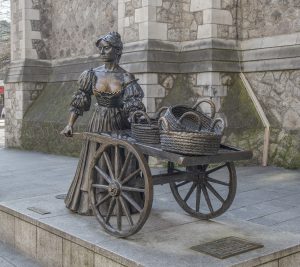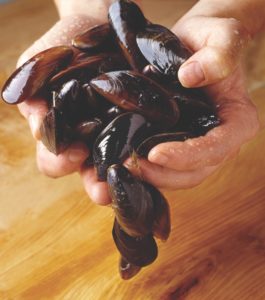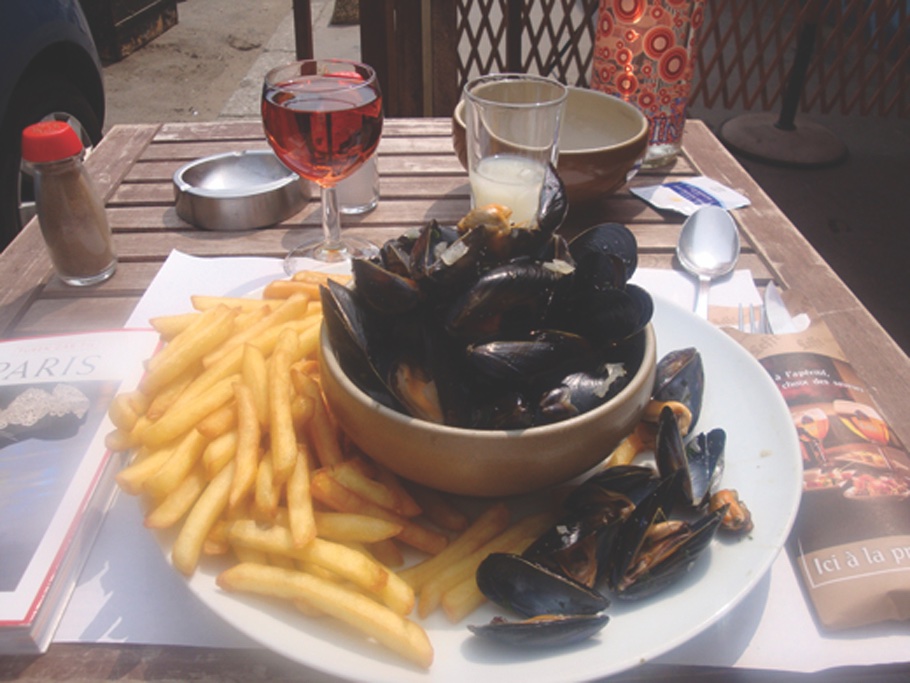“She wheeled her wheelbarrow through streets broad and narrow, crying “cockles and mussels, alive alive o.”
– From the song, “Mussels and Cockles” that remembers the street vendor, Molly Malone.
The Irish have been eating shellfish since humans first set foot on the Emerald Isle. Huge shell piles called middens have been found at every seaside archaeological site, which proves that shellfish was a dietary mainstay for Ireland’s Mesolithic hunter-gatherers. Some mollusks were used to make the rare purple dyes reserved for garments of kings and princes, but for the most part, shellfish provided a vital source of protein along with fish and marine vegetables like dulse, laver, and carrageen moss.
Eons later, during the Great Famine, it was the inhabitants of fishing villages who survived best. Ironically, tales of starving victims desperately searching the beaches for food turned succeeding generations against shellfish. It took more than a hundred years for the bitter memory to fade.
Today, mussels and oysters take top billing on the list of Irish mollusks, but in times past all manner of shellfish were eaten. The catch was especially rich in Galway Bay, once the exclusive territory of fishermen who lived in a settlement near the Spanish Arch, known as the Cladach. A 19th century advertisement for fish sold on Claddagh Quay offers “…cods, lings, hawkfish, turbets, plaises, pilchards, a liberal of oyster, scallops, cockles, mussels, razures, also plentie of lobsters, crabs and shromps.”
The wild Atlantic off Ireland’s western coast has always been known for its abundance. Tomas O’Crohan, who was born on Great Blasket Island (an Blascaod Mór) in 1856, wrote about local seafood in his masterpiece, The Islandman.
“The food I got was eggs, lumps of butter, fish, limpet and winkles – a bit of everything going from sea to land… My mother had brought a dish of limpets from the strand with her… She was roasting the limpets and throwing them to us one by one like a hen with chickens.”
According to a Gaelic proverb: is iad na diúilicíní bia na ríthe, is bia na tuathánach iad na géagairíní (mussels are the food of kings, limpets are the food of peasants). Certainly mussels are bigger, more flavorful and easier to prepare in myriad ways than tiny limpets. But it is their sheer numbers that always made the black bivalves a primary food item for rich and poor alike. Mussels grow almost everywhere. They are found clinging to offshore boulders, adhered to the rocks of pebble beaches, and bound up in the seaweeds of muddy estuaries. When the tides retreat, they are easily harvested by hand or with nets.
Thanks to huge offshore fanning operations, mussels are the most common shellfish sold in Ireland. Although mussel farming was perfected by the French, the method was actually invented in 1235 by an Irishman named Walton who was shipwrecked in the Bay of Aiguillon on the west coast of France. Obliged to come up with ingenious ways to guarantee his survival, Walton devised a way of trapping sea birds with a net attached by long poles to the seabed. When he discovered that the poles became covered in mussels, the savvy Irishman abandoned bird hunting for full-time mussel farming.
Today mussels are most commonly farmed on ropes suspended from rafts that are anchored in shallow waters. Tiny mussels are seeded onto the ropes, and when the spawn reach a mature size, the ropes are simply pulled up and harvested. Until recently, most of Europe’s mussels were grown in the Mediterranean Sea, but it has become so polluted that Ireland’s pristine waters are now the principal source of mussels for the European market. One of Ireland’s largest mussel farms can be seen permanently bobbing in Bantry Bay.

Fishermen believed that cockles could not be eaten “until they had three drinks of April water.” Immediately after the third April tide, cockle pickers flocked to the beaches. Where the sand curled like a worm was the place to dig. Sometimes the meat was extracted from the shell with a pin and eaten on the spot, but usually the cockles were taken home, washed to remove the sand, and boiled in salted water. Cockle Pie (cooked cockles and grated onions baked in a pastry shell) was once a favorite summer supper.
Few people go to the bother of gathering mussels or picking cockles anymore, it being easier to select dinner from the wide assortment of seafood offered by a fish-monger or supermarket. But Molly has not been forgotten. In central Dublin, a bronze statue of a maid pushing her cart laden with mollusks pays eternal homage to the cockles and mussels women who once sold cupfuls of their wares from wheelbarrows in the Liberties. We always will love you, sweet Molly Malone. Slainte! ♦
Recipes
Selecting and Cleaning Mussels
Cleaning Mussels
Select your mussels individually. Mussels must have tightly closed shells until cooked. If the mussels are placed in a plastic bag, make sure it is left open as without air the mussels will die. If any are open when you are ready to clean them, a sharp squeeze should cause the shell to close. Clean mussels just before cooking. Scrub them under running water with a stiff brush to
remove debris, and pull off the beards (tufts of fibers projecting from the shell that anchored the mollusk to its underwater perch). Never cook a mussel that remains open. A gaping or broken shell means the mussel has died, and is not safe to eat. Conversely, never eat a cooked mussel if the shell has remained tightly closed.
Garlic Stuffed Mussels
24 fresh cleaned mussels
1⁄4 cup water
2 tablespoons melted butter
2 cloves garlic, minced
1 cup fine dry bread crumbs
1⁄4 cup minced parsley fresh lemon juice
salt and pepper
Place mussels in a large pot with the water. Bring to a boil, cover tightly and steam for approximately 5 minutes, or until the shells have opened. Remove and discard one side of each mussel shell and place the mussel halves in a shallow baking pan.
Combine the butter, garlic, bread crumbs and parsley with lemon juice, salt and pepper to taste. Spoon bread crumb mixture onto each mussel half being sure to cover the meat completely. Place under a pre-heated broiler and grill 5-10 minutes, or until bread crumbs are golden brown. Makes four appetizer servings.
Classic Steamed Mussels
3 pounds fresh cleaned mussels
2 tablespoons butter
1 medium onion finely chopped
1 bunch parsley, stems removed and minced
2 cloves garlic, minced
1 cup dry white wine
1 cup half-and-half
Melt butter in a large stainless steel soup pot. Add onion, parsley and garlic, and sauté until wilted. Add mussels, and pour in wine. Cover tightly and steam for approximately 5 minutes, or until the mussels have opened. Remove mussels to serving dishes. Add cream to cooking liquid and bring to the boiling point.
Remove from heat, stir and pour over the mussels. Accompany with lots of crusty bread to mop up the broth. Makes four appetizer servings or two main dish servings.

An Bord Iascaigh Mhara (Irish Sea Fisheries Board)
Potato, Bacon, and Mussel Soup with Oatmeal Herb Crust
1 pound mussels
1⁄2 cup water
1⁄4 cup white wine
2 tablespoons vegetable oiI
1 pound potatoes, peeled and diced
8 ounces traditional Irish bacon, diced
3 leeks, diced
2 medium onions finely chopped
1 quart chicken stock or canned chicken broth
1⁄2 teaspoon dried thyme, crumbled
2 tablespoons butter
1 tablespoon chopped herbs (chives, parsley, dill).
1⁄4 cup McCann’s Irish steel cut (pinhead) oatmeaI
salt and pepper to taste
Mussels
In a large saucepan, bring the water and wine to a boil. Add the mussels.
Cover and steam for 5 minutes, or until the mussels open. Discard any mussels that do not open. Reserve the cooking liquid and remove the mussels from their shells. Reserve.
Soup Base
Heat the oil in a large soup pot. Add the bacon, leeks and onions. Sauté 2-3 minutes. Add the potatoes and sauté 2 minutes longer. Add the stock and thyme, bring to a boil. Reduce heat and simmer for 15 minutes. Stir in the reserved mussels and cooking liquid. Cook 4-5 minutes longer. Meanwhile, melt the butter in a sauté pan. Combine the oatmeal and herbs and add in the butter, then toast until light brown.
Serve the soup with a sprinkling of the oatmeal over the soup. Serves 4.
Ed. Note: Many restaurants in Ireland serve superb mussels, but two places stand out particularly: McGann’s Restaurant and Pub, Doolin, Co. Clare, in the hearth of the Burren, and Johnny Fox’s (the highest pub in Ireland), in the Dublin mountains. After lunch you can take the back road to Powerscourt and drive on to Glendalough.


My absolute favorite Irish song. When I went to Ireland my first stop was at the Molly Malone statue. Thank you for the beautiful rendition.